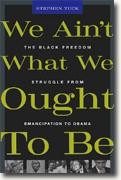We Ain't What We Ought To Be
Stephen Tuck
book reviews:
· general fiction
· chick lit/romance
· sci-fi/fantasy
· graphic novels
· nonfiction
· audio books
· author interviews
· children's books @
curledupkids.com
· DVD reviews @
curledupdvd.com
newsletter
win books
buy online
links
home
for authors
& publishers
for reviewers

 |
We Ain't What We Ought To Be: The Black Freedom Struggle from Emancipation to Obama Stephen Tuck Belknap Press of Harvard University Press Hardcover 528 pages January 2010 |
|
Stephen Tuck has written what must be the most comprehensive history of the civil rights movement that you’ll find in a single volume. Those who think the movement began and ended in the 1960s will be surprised to find that Tuck’s book starts with the anti-slavery activism of the mid-19th century. Abolitionists like Frederick Douglass, Harriet Tubman and Sojourner Truth are fixtures in high school history books, but here we meet a myriad of activists whose names are seldom mentioned. From Robert Smalls’s daring hijack of a Confederate navy ship to the Union League formed by freed slaves in the 1860s and the Colored Farmers’ Alliance of the 1880s, the size and scope of what must be viewed as a budding civil rights movement is considerably more in-your-face than standard depictions of the time would suggest.
There were, of course, some organized programs that drew attention to the plight of the black community. In 1877, black washerwomen in Galveston went on strike. In 1878, a National Conference of Colored Men “…called for ‘the same rights accorded the other nationalities of our country.’” Such strikes were remarkable not only for their effectiveness but also for their audacity and served as models for the Bus Boycott that would eventually make a nation sit up and take notice. While progress toward civil and equal rights was slow, it nevertheless continued. The Tuskeegee Airmen are well-known these days, but few are aware of the massive number of black Americans, both male and female, who served in the military during World War II. Their patriotism is commendable, especially given the racial prejudice that was still rampant (and perfectly acceptable to most), but it is easy to understand the feelings of one black man in Detroit who admitted that when he heard Pearl Harbor had been attacked “jumped up and laughed. ‘Well, sir,’ I said, ‘I don’t guess the white folks will say colored people can’t fly airplanes from now on.’” Moving into the more widely-known movement and personalities of the 1960s, Tuck reveals surprising details. Dr. Martin Luther King, Jr., is generally credited for much of the progress made during that decade. “This perception was entirely mistaken,” according to his colleague Ella Baker. “The movement made King, he didn’t make the movement.” Nor was King’s message of non-violence the only approach to the problem. The short-lived Black Power movement spawned not only a more aggressive approach to justice but also ongoing recognition of black culture, such as Kwanzaa. As the author points out in his prologue, We Ain't What We Ought To Be Originally published on Curled Up With A Good Book at www.curledup.com. © Deborah Adams, 2010 |
|
|
|
 Click here to learn more about this month's sponsor! |
|
| fiction · sf/f · comic books · nonfiction · audio newsletter · free book contest · buy books online review index · links · · authors & publishers reviewers |
|
| site by ELBO Computing Resources, Inc. | |
 From the earliest recognition of the need for equality, there have been multiple organizations and strategies as well as multiple goals, and this was true even before the organized protests of the 1960s. “There was no such thing as a single black protest agenda because there was no such thing as a single black experience,” Tuck writes. Certainly the efforts of every single person and every single act large and small can be included, but Tuck has done an admirable job of sifting and refining. A neat technique is his use of quotations at the beginning of each chapter that summarize the tone of various goals spanning the time period covered.
From the earliest recognition of the need for equality, there have been multiple organizations and strategies as well as multiple goals, and this was true even before the organized protests of the 1960s. “There was no such thing as a single black protest agenda because there was no such thing as a single black experience,” Tuck writes. Certainly the efforts of every single person and every single act large and small can be included, but Tuck has done an admirable job of sifting and refining. A neat technique is his use of quotations at the beginning of each chapter that summarize the tone of various goals spanning the time period covered.